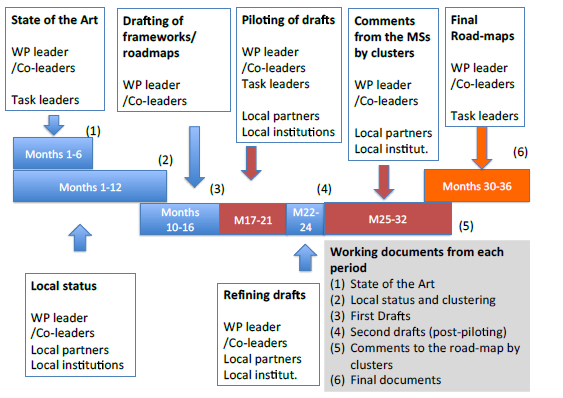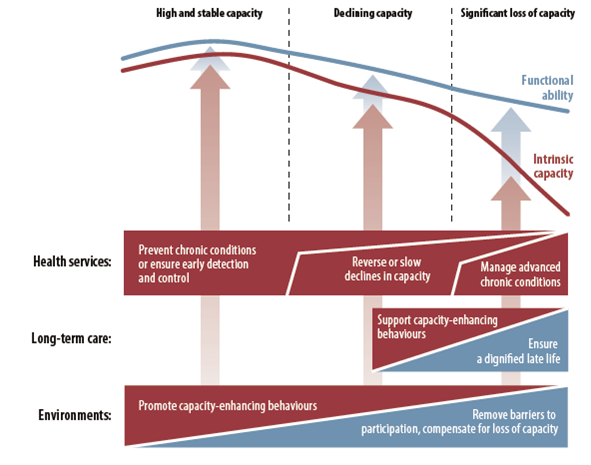The main aim of the project is the development of the concept of “Addressing Frailty Prevention” in health and social care services, encouraging consensus to create a shared understanding on frailty that will be used by the MS.
The purpose is to obtain a shared focus for the management of elderly people who are frail or are at risk of developing frailty in the EU.
Elderly people who are frail or are at risk of developing frailty, disabilities and multi-morbidity.
In general terms, we foresee three main phases that correspond to three aims of the Joint Action.
- Phase I (M1 to M12): collection of background information, analysis, rational discussion and drafting using the information from preliminary documents.
- Phase II (M13 to M24): development and testing of the draft focusing on frailty prevention (FPA).
- Phase III (M25 to M36): drafting of final documents, debate among participating MS and drafting of the final framework and the roadmap for the FPA.
 In this way, the work to be done in the project is divided into Work Packages (WP): Project lasting 36 months
In this way, the work to be done in the project is divided into Work Packages (WP): Project lasting 36 months
- WP1: Project coordination (Month 1 – Month 36)
- WP2: Communication, Knowledge and Dissemination (Month 1 – Month 36)
- WP3: Project evaluation (Month 1 – Month 36)
- WP4: Learn about frailty at an individual level (Month 1 – Month 36)
- WP5: Learn about frailty at a population level (Month 1 – Month 36)
- WP6: Frailty management at an individual level (Month 1 – Month 36)
- WP7: Care models to prevent or delay the progression of frailty and enable people to live well with frailty (Month 1 – Month 36)
- WP8: Extend and increase knowledge on frailty to promote an innovative frailty policy (Month 1 – Month 36)
The ADVANTAGE project contributes to the reduction of disabilities and dependency and avoids growing health demands due to the increase of the load of chronic illnesses.
It will also help to provide a more efficient response to the needs of elderly people when providing care, including gender-susceptible aspects, through a better planning and coordination of care, an innovative organisational focus and a better collaboration between professional and informal caregivers, including self-management support.
Role of Kronikgune in the project: Kronikgune will lead the “Knowledge” task of the Work Package 2 (WP2), which has the purpose of disseminating information on the challenge of frailty and disability and raising awareness while promoting frailty prevention and management. It will also participate in the tasks related to Work Package 4 (WP4). And lead the task “Information and Communications Technology (ICT)”, within work package 6, that pursues the purpose of analysing existing ICT tools and applications for the prevention, detection, diagnosis, treatment and / or control of frailty in clinical practice. Last of all, within work package 7, it will lead the task “Analysis and lessons learned from the established integrated care models” to analyse how the integrated care models are being implemented and assessing the impact of the interventions.
Role of Osakidetza in the project: Osakidetza participates in this project as an affiliate entity, linked to Kronikgune, and will collaborate in the same tasks that have been assigned to Kronikgune.
- Coordination: Olatz Albaina Bacaicoa; Danika Schepis; Ane Fullaondo Zabala; Esteban de Manuel Keenoy.
- Evaluation: Antonio de Blas; Marbella Garcia; Javier Mar; Mari Luz Peña; Mari Carmen Rodriguez; Arantza Uranga; Itziar Vergara; Jon Zugazagoitia.

